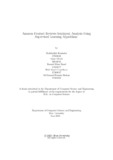| dc.contributor.advisor | Ashraf, Faisal Bin | |
| dc.contributor.author | Hawladar, Mohibullah | |
| dc.contributor.author | Ghosh, Arjan | |
| dc.contributor.author | Raad, Zaoyad Khan | |
| dc.contributor.author | Chowdhury, Wali Ahad | |
| dc.contributor.author | Shehan, Md Sazzad Hossain | |
| dc.date.accessioned | 2021-09-04T11:06:56Z | |
| dc.date.available | 2021-09-04T11:06:56Z | |
| dc.date.copyright | 2021 | |
| dc.date.issued | 2021 | |
| dc.identifier.other | ID 17101058 | |
| dc.identifier.other | ID 20141045 | |
| dc.identifier.other | ID 17101077 | |
| dc.identifier.other | ID 17301057 | |
| dc.identifier.other | ID 17301150 | |
| dc.identifier.uri | http://hdl.handle.net/10361/14970 | |
| dc.description | This thesis is submitted in partial fulfillment of the requirements for the degree of Bachelor of Science in Computer Science and Engineering, 2021. | en_US |
| dc.description | Cataloged from PDF version of thesis. | |
| dc.description | Includes bibliographical references (pages 41-42). | |
| dc.description.abstract | E-commerce is gaining traction in today’s digitalized environment by taking products closer to customers without forcing them to leave their homes. A customer
must study hundreds of reviews before making a purchase. The amount of internet
evaluations for a single product can easily approach millions and make tracking and
understanding of client feedback difficult. In the era of machine learning, however,
it would be much easier to gain thousands of input and knowledge from them if a
model were employed to polarize and understand from them. Consequently, sentiment analysis is a new study area combining natural language processing and text
analytic to extract subjective information from sources and classify the polarity of
expressed sentiments. We have employed Vector Machine Support, Naive Bays, Decision Tree, Random Forest, Logistic Regression, and MLP Classifiers for large-scale
supervised education on the Amazon dataset and obtained satisfactory results. In
the meantime, the MLP classifier produced the best results. Finally, this paper
discusses sentiment analysis and product feedback opinion mining. | en_US |
| dc.description.statementofresponsibility | Mohibullah Hawladar | |
| dc.description.statementofresponsibility | Arjan Ghosh | |
| dc.description.statementofresponsibility | Zaoyad Khan Raad | |
| dc.description.statementofresponsibility | Wali Ahad Chowdhury | |
| dc.description.statementofresponsibility | Md Sazzad Hossain Shehan | |
| dc.format.extent | 42 pages | |
| dc.language.iso | en | en_US |
| dc.publisher | Brac University | en_US |
| dc.rights | Brac University theses are protected by copyright. They may be viewed from this source for any purpose, but reproduction or distribution in any format is prohibited without written permission. | |
| dc.subject | Sentiment Analysis | en_US |
| dc.subject | Opinion Mining | en_US |
| dc.subject | Amazon Review Analysis | en_US |
| dc.subject | Support Vector Machine (SVM) | en_US |
| dc.subject | Decision tree | en_US |
| dc.subject | Logistic Regression | en_US |
| dc.subject | MLP | en_US |
| dc.subject | Random Forest Analysis | en_US |
| dc.subject.lcsh | Sentiment analysis. | |
| dc.title | Amazon product reviews sentiment analysis using supervised learning algorithms | en_US |
| dc.type | Thesis | en_US |
| dc.contributor.department | Department of Computer Science and Engineering, Brac University | |
| dc.description.degree | B. Computer Science | |

